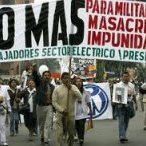
2 May 2011 | Special reports | Resisting neoliberalism
To the Streets
May 1st Celebrations in Bolivia, Ecuador and Colombia
Download: MP3 (2.5 Mb)
The International Workers’ Day was celebrated around Latin America with actions carried out by workers and all commemorations shared a common feature: the denunciation against projects that deplete natural resources and populations.
In Colombia, the International Workers’ Day didn’t mean a “truce” in terms of the permanent repression suffered by social movements in that country. In Bogota and Cali, the events were violently ended and the attacks by police officers resulted in several injured people. The main space of police repression in Bogota was Bolivar Square. Several trade-union leaders and members of the Polo Democratico party were present in the Square waiting for the march that was coming from Plaza de Toros.
Prior to the arrival of the workers, a small group conducted acts of vandalism, which served as an “excuse” for the police to repress all people present, using tear gases and violently attacking the demonstrators, which resulted in many people injured.
Telesur gathered the testimony of journalist Carlos Lozano from La Voz newspaper, who said that the police sabotaged the demonstrations through violence. He also denounced the use of violence to “try to silence the protests and the opposition” against Juan Manuel Santos’ administration. In addition to the marches carried out by the workers, there were protests held by students in several Colombian cities who oppose to the privatization of university education through the National Development Plan.
This Plan, which was recently passed by the Senate, “is giving the territory to big landowners and mining megaprojects, with serious impacts on the environment and the social development of regions”, according to Alexander Lopez, member of the Polo Democratico Alternativo Party.
Meanwhile, in Ecuador, May 1st was overshadowed by the consultation to take place on May 7th promoted by Rafael Correa’s administration which is opposed by the majority of the peasant-indigenous movement.
The consultation includes five questions, some of them related to the court system and the Criminal Code that would increase the power of the Executive to fight the issue of “insecurity”. The movements denounce that the reform would increase repression and would enable the government to take unilateral decisions, for instance, the signing of investment protection and free trade agreements with the US and the European Union.
On Sunday, May 1st, there were two marches which arrived to downtown Quito, one with activists of the party in office Alianza Pais, encouraging people to vote YES, and another one led by leaders of the opposition who promoted the “NO”. The march was the final part of the caravan organized by the Federation of Indigenous Groups of Ecuador (CONAIE), among others.
In Bolivia, President Evo Morales participated in the events to commemorate the Workers’ Day where he announced the repeal of a neoliberal decree from 1985 that established “market economy” (capitalism) as the national economic model.
“Workers and indigenous people, the real workers, the leaders with ideologies and political and cultural awareness can’t be instruments of capitalism, of imperialism, of neoliberalism”, said the Bolivian President in Huanuni.
In El Alto, near La Paz, capital city of Bolivia, Morales celebrated the 5th anniversary of the nationalization of hydrocarbons, one of the measures that featured the first indigenous government of the country.
Photo: www.kaosenlared.net







